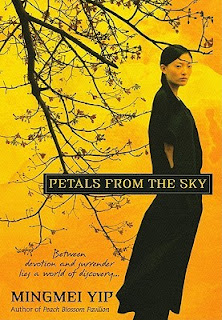 Summary
Summary: Isabelle Lee is forced to leave her job as an editorial assistant at a swank New York magazine and decides to try her luck in Beijing, where her older sister Claire is practicing law. The two sisters were never very close but Claire invites Isabelle to stay in her spacious modern apartment in Beijing, and helps her get a job as a food writer for an English language magazine,
Beijing NOW.
Claire gives her advice on how to interview a famous Chinese film director:
Isabelle feels like a fish out of water as she doesn't speak Mandarin well, has no friends in the city, and still feels intimidated by her older sister, the successful Ivy League graduate and lawyer who has fulfilled all their parents' expectations, except one, that is. The sisters feel the pressure of their parents, even in far away Beijing, to marry a Han Chinese and provide grandchildren as soon as possible.
You don't know how I appreciate this, " I say in a rush.
In the car, Claire issues advice while simultaneously checking her BlackBerry, scanning the newspaper, and smoothing on another coat of lipstick. "Just be casual," she says, her voice as instructive as Dear Abby. "Men don't like it when women are too aggressive. Especially Chinese guys."
How the sisters deal with their parents, how Isabelle handles Beijing, her job writing on regional Chinese food, and the attentions of Jeff, a Chinese rock singer, as well as the interest of a mysterious young American neighbor, Charlie, are the meat of the novel.
Comments: I loved traveling with Isabelle to places in Beijing, Shanghai, Hong Kong, and Xinjiang to try out different styles of Chinese food. Her descriptions of the different kinds of "hot" in spicy Sechuan food made me want to try
mapo tofu, bean curd cooked in hot chili oil. (The recipe is included in the back of the book, along with a few other dishes.)Here Isabelle takes her American friend Julia to breakfast in Hong Kong:
The conversation falters as we nibble dainty dumplings filled with shrimp peeping pale and pink through their translucent wrappers. We dive into plates of soy-sauce-scented rice noodles, unwrap bamboo leaves to reveal triangles of sticky rice....
"The food here is amazing. So fresh!" says Julia, her voice soft with awe. This is the best dimsum I've ever had. Ooh!" she exclaims, flagging down a passing cart. "Chicken feet!"
I enjoyed Ann Mah's writing and the way she combined setting and regional cuisine in her story of the two Chinese-American sisters. I could relate to demands or expectations of parents, and the sometimes testy relationship between a younger and older sibling - these seem to be universal.
About the author: Ann Mah was born in California and lived in Beijing for four years, working as a dining manager for an English-language magazine. She was awarded a James Beard Culinary Scholarship in 2005 and now lives in Paris.
Challenges: 100+ Reading Challenge, China Challenge, Support your Local Library Challenge
Cym Lowell: Book Review Party Wednesday









 , which became an international bestseller.
, which became an international bestseller. 




